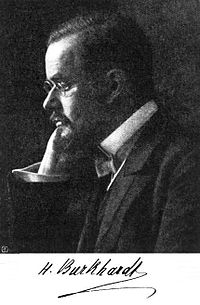Heinrich Burkhardt Scientist
Heinrich Friedrich Karl Ludwig Burkhardt (10 October 1861 – 2 November 1914) was a German mathematician. He famously was one of the examiners of Albert Einstein's PhD thesis. Of Einstein's thesis he stated: "The mode of treatment demonstrates fundamental mastery of the relevant mathematical methods" and "What I checked, I found to be correct without exception."Burkhardt was born in Schweinfurt. Starting from 1879 he studied under Karl Weierstrass, Alexander von Brill, and Hermann Amandus Schwarz in Munich (at university and technical university), Berlin and Göttingen. He attained a doctorate in 1886 in Munich under Gustav Conrad Bauer with a thesis entitled: Beziehungen zwischen der Invariantentheorie und der Theorie algebraischer Integrale und ihrer Umkehrungen (Relations between the invariant theory and the theory of algebraic integrals and their inverses).In 1887 he was an assistant at Göttingen and obtained his habilitation there in 1889. Later he was a professor in Zürich (1897–1908) and Munich (since October 1908). He worked on the theory of the elliptical functions, series expansions, group theory, the Burkhardt quartic, and history of mathematics.He died in Neuwittelsbach/München, of a disease of the stomach, diagnosed about Easter 1914.
Personal facts

| Birth date | October 10, 1861 |
|---|---|
| Birth place | |
| Nationality | |
| Date of death | November 02, 1914 |
| Place of death | |
| Education |